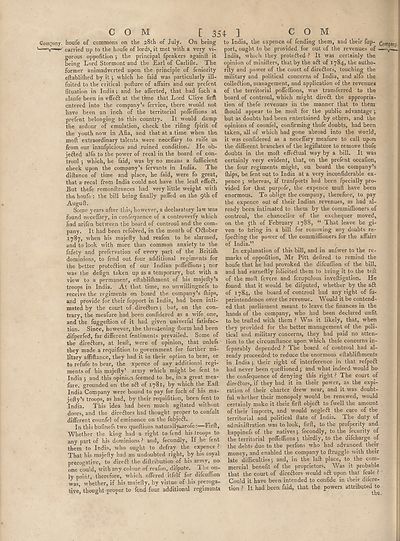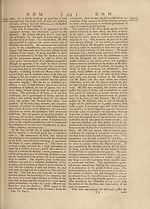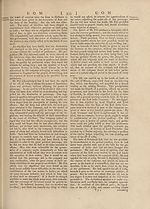Encyclopaedia Britannica, or, a Dictionary of arts, sciences, and miscellaneous literature : enlarged and improved. Illustrated with nearly six hundred engravings > Volume 6, CHI-Crystallization
(372) Page 354
Download files
Complete book:
Individual page:
Thumbnail gallery: Grid view | List view

COM [ 354- ) COM
Company, houfe of commons on the 28th of July. On being
■*—carried up to the houfe of lords, it met with a very vi¬
gorous oppofition •, the principal fpeakers againft it
being Lord Stormont and the Earl of Carlifle. The
former animadverted upon the principle of feniority
eftablifhed by it j which he faid was particularly ill-
fuited to the critical pofture of affairs and our prefent
iituation in India; and he alferted, that had fuch a
claufe been in effect at the time that Lord Clive firft
entered into the company’s fervice, there would not
have been an inch of the territorial poffeffions at
prefent belonging to this country. It would damp
the ardour of emulation, check the rifing fpirit of
the youth now in Afia, and that at a time when the.
moft extraordinary talents were neceflary to raife us
from our inaufpicious and ruined condition. He ob¬
jected alfo to the pow'er of recal in the board of con-
troul ; which, he faid, was by no means a fufficient
check upon the company’s fervants in India. The
diftance of time and place, he faid, were fo great,
that a recal from India could not have the lead effeft.
But thefe remonftrances had very little weight with
the houfe : the bill being finally palfed on the 9th of
Auguft.
Some years after this, however, a declaratory law was
found neceflary, in confequence of a controverfy which
had arifen between the board of controul and the com¬
pany. It had been refolved, in the month of Odlober
1787, when his majefty had reafon to be alarmed,
and to look with more than common anxiety to the
fafety and prefervation of every part of the Britifti
dominions, to fend out four additional regiments for
the better proteftion of our Indian pofleflions ; nor
was the defign taken up as a temporary, but with a
view to a permanent, eftabliftiment of his majefty’s
troops in India. At that time, no unwillingnefs to
receive the regiments on board the company’s (hips,
and provide for their fupport in India, had been inti¬
mated by the court of directors 5 but, on the con¬
trary, the meafure had been confidered as a wife one,
and the fuggeftion of it had given univerfal fatisfac-
tion. Since, however, the threatening ftorm had been
difperfed, far different fentiments prevailed. Some of
the directors, at leaft, were of opinion, that unlefs
they made a requifition to government for further mi¬
litary afliftance, they had it in their option to bear, or
to refufe to bear, the xpence of any additional regi¬
ments of his majefty’ ■ army which might be fent to
India j and this opinion feemed to be, in a great mea¬
fure, grounded on the aft of 1781, by which the Eaft
India Company were bound to pay for fuch of his ma¬
jefty’s troops, as had, by their requifition, been fent to
India. This idea had been much agitated without
doors, and the direftors had thought proper to confult
different counfel of eminence on the fubjeft.
In this bufinefs two queftions naturallytarofe:—Firft,
Whether the king had a right to fend his troops to
any part of his dominions ? and, fecondly, If he fent
them to India, who ought to defray the expence ?
That his maiefty had an undoubted right, by his royal
prerogative, to direft the diftribution of his army, no
one could, with any colour of reafon, difpute. I he on¬
ly point, therefore, which offered itfelf for difeuflion
was, whether, if his majefty, by virtue of his preroga¬
tive, thought proper to fend four additional regiments
to India, the expence of fending them, and their fup¬
port, ought to be provided for out of the revenues of
India, which they protefted ? It was certainly the
opinion of minifters, that by the aft of 1784, the autho¬
rity and power of the court of direftors, touching the
military and political concerns of India, and alfo the
colleftion, management, and application of the revenues
of the territorial pofleflions, was transferred to the
board of controul, which might direft the appropria¬
tion of thefe revenues in the manner that to them
fhould appear to be moft for the public advantage j
but as doubts had been entertained by others, and the
opinions of counfel, confirming thofe doubts, had been
taken, all of which had gone abroad into the world,
it was confidered as a neceflary meafure to call upon
the different branches of the legiflature to remove thofe
doubts in the moft effeftual way by a bill. It was
certainly very evident, that, on the prefent occafion,
the four regiments might, on board the company’s
ftiips, be fent out to India at a very inconfiderable ex¬
pence $ whereas, if tranfports had been fpecially pro¬
vided for that purpofe, the expence muft have been
enormous. To oblige the company, therefore, to pay
the expence out of their Indian revenues, as had al¬
ready been intimated to them by the commiflioners of
controul, the chancellor of the exchequer moved,
on the 5th of February 1788, “ That leave be gi¬
ven to bring in a bill for removing any doubts re-
fpefting the power of the commiflioners for the affairs
of India.”
In explanation of this bill, and in anfwer to the re¬
marks of oppofition, Mr Pitt defired to remind the
houfe that he had provoked the difeuflion of the bill,
and had earneftly folicited them to bring it to the teft
of the moft fevere and fcrupulous inveftigation. He
found that it would be difputed, whether by the aft
of 1784, the board of controul had any right of fu-
perintendence over the revenue. Would it be contend¬
ed that parliament meant to leave the finances in the
hands of the company, who had been declared unfit
to be trufted with them ? Was it likely, that, when
they provided for the better management of the poli¬
tical and military concerns, they had paid no atten¬
tion to the circumftance upon which thefe concerns in-
feparably depended ? The board of controul had al¬
ready proceeded to reduce the enormous eftablifhments
in India ; their right of interference in that refpeft
had never been queftioned; and what indeed would be
the confequence of denying this right ? The court of
direftors, if they had it in their power, as the expi¬
ration of their charter drew near, and it was doubt¬
ful whether their monopoly would be renewed, would
certainly make it their firft objeft to fwell the amount
of their imports, and would negleft the care of the
territorial and political ftate of India. The duty of
adminiftration was to look, firft, to the profperity and
happinefs of the natives; fecondly, to the fecurity of
the territorial pofleflions •, thirdly, to the difeharge of
the debts due to the perfons who had advanced their
money, and enabled the company to ftruggle with their
late difficulties 5 and, in the laft place, to the com¬
mercial benefit of the proprietors. Was it probable
that the court of direftors would aft upon that fcale ?
Could it have been intended to confide in their difere-
tion ? It had been faid, that the powers attributed to
Company, houfe of commons on the 28th of July. On being
■*—carried up to the houfe of lords, it met with a very vi¬
gorous oppofition •, the principal fpeakers againft it
being Lord Stormont and the Earl of Carlifle. The
former animadverted upon the principle of feniority
eftablifhed by it j which he faid was particularly ill-
fuited to the critical pofture of affairs and our prefent
iituation in India; and he alferted, that had fuch a
claufe been in effect at the time that Lord Clive firft
entered into the company’s fervice, there would not
have been an inch of the territorial poffeffions at
prefent belonging to this country. It would damp
the ardour of emulation, check the rifing fpirit of
the youth now in Afia, and that at a time when the.
moft extraordinary talents were neceflary to raife us
from our inaufpicious and ruined condition. He ob¬
jected alfo to the pow'er of recal in the board of con-
troul ; which, he faid, was by no means a fufficient
check upon the company’s fervants in India. The
diftance of time and place, he faid, were fo great,
that a recal from India could not have the lead effeft.
But thefe remonftrances had very little weight with
the houfe : the bill being finally palfed on the 9th of
Auguft.
Some years after this, however, a declaratory law was
found neceflary, in confequence of a controverfy which
had arifen between the board of controul and the com¬
pany. It had been refolved, in the month of Odlober
1787, when his majefty had reafon to be alarmed,
and to look with more than common anxiety to the
fafety and prefervation of every part of the Britifti
dominions, to fend out four additional regiments for
the better proteftion of our Indian pofleflions ; nor
was the defign taken up as a temporary, but with a
view to a permanent, eftabliftiment of his majefty’s
troops in India. At that time, no unwillingnefs to
receive the regiments on board the company’s (hips,
and provide for their fupport in India, had been inti¬
mated by the court of directors 5 but, on the con¬
trary, the meafure had been confidered as a wife one,
and the fuggeftion of it had given univerfal fatisfac-
tion. Since, however, the threatening ftorm had been
difperfed, far different fentiments prevailed. Some of
the directors, at leaft, were of opinion, that unlefs
they made a requifition to government for further mi¬
litary afliftance, they had it in their option to bear, or
to refufe to bear, the xpence of any additional regi¬
ments of his majefty’ ■ army which might be fent to
India j and this opinion feemed to be, in a great mea¬
fure, grounded on the aft of 1781, by which the Eaft
India Company were bound to pay for fuch of his ma¬
jefty’s troops, as had, by their requifition, been fent to
India. This idea had been much agitated without
doors, and the direftors had thought proper to confult
different counfel of eminence on the fubjeft.
In this bufinefs two queftions naturallytarofe:—Firft,
Whether the king had a right to fend his troops to
any part of his dominions ? and, fecondly, If he fent
them to India, who ought to defray the expence ?
That his maiefty had an undoubted right, by his royal
prerogative, to direft the diftribution of his army, no
one could, with any colour of reafon, difpute. I he on¬
ly point, therefore, which offered itfelf for difeuflion
was, whether, if his majefty, by virtue of his preroga¬
tive, thought proper to fend four additional regiments
to India, the expence of fending them, and their fup¬
port, ought to be provided for out of the revenues of
India, which they protefted ? It was certainly the
opinion of minifters, that by the aft of 1784, the autho¬
rity and power of the court of direftors, touching the
military and political concerns of India, and alfo the
colleftion, management, and application of the revenues
of the territorial pofleflions, was transferred to the
board of controul, which might direft the appropria¬
tion of thefe revenues in the manner that to them
fhould appear to be moft for the public advantage j
but as doubts had been entertained by others, and the
opinions of counfel, confirming thofe doubts, had been
taken, all of which had gone abroad into the world,
it was confidered as a neceflary meafure to call upon
the different branches of the legiflature to remove thofe
doubts in the moft effeftual way by a bill. It was
certainly very evident, that, on the prefent occafion,
the four regiments might, on board the company’s
ftiips, be fent out to India at a very inconfiderable ex¬
pence $ whereas, if tranfports had been fpecially pro¬
vided for that purpofe, the expence muft have been
enormous. To oblige the company, therefore, to pay
the expence out of their Indian revenues, as had al¬
ready been intimated to them by the commiflioners of
controul, the chancellor of the exchequer moved,
on the 5th of February 1788, “ That leave be gi¬
ven to bring in a bill for removing any doubts re-
fpefting the power of the commiflioners for the affairs
of India.”
In explanation of this bill, and in anfwer to the re¬
marks of oppofition, Mr Pitt defired to remind the
houfe that he had provoked the difeuflion of the bill,
and had earneftly folicited them to bring it to the teft
of the moft fevere and fcrupulous inveftigation. He
found that it would be difputed, whether by the aft
of 1784, the board of controul had any right of fu-
perintendence over the revenue. Would it be contend¬
ed that parliament meant to leave the finances in the
hands of the company, who had been declared unfit
to be trufted with them ? Was it likely, that, when
they provided for the better management of the poli¬
tical and military concerns, they had paid no atten¬
tion to the circumftance upon which thefe concerns in-
feparably depended ? The board of controul had al¬
ready proceeded to reduce the enormous eftablifhments
in India ; their right of interference in that refpeft
had never been queftioned; and what indeed would be
the confequence of denying this right ? The court of
direftors, if they had it in their power, as the expi¬
ration of their charter drew near, and it was doubt¬
ful whether their monopoly would be renewed, would
certainly make it their firft objeft to fwell the amount
of their imports, and would negleft the care of the
territorial and political ftate of India. The duty of
adminiftration was to look, firft, to the profperity and
happinefs of the natives; fecondly, to the fecurity of
the territorial pofleflions •, thirdly, to the difeharge of
the debts due to the perfons who had advanced their
money, and enabled the company to ftruggle with their
late difficulties 5 and, in the laft place, to the com¬
mercial benefit of the proprietors. Was it probable
that the court of direftors would aft upon that fcale ?
Could it have been intended to confide in their difere-
tion ? It had been faid, that the powers attributed to
Set display mode to:
![]() Universal Viewer |
Universal Viewer | ![]() Mirador |
Large image | Transcription
Mirador |
Large image | Transcription
Images and transcriptions on this page, including medium image downloads, may be used under the Creative Commons Attribution 4.0 International Licence unless otherwise stated. ![]()
| Permanent URL | https://digital.nls.uk/193012259 |
|---|
| Attribution and copyright: |
|
|---|
| Description | Ten editions of 'Encyclopaedia Britannica', issued from 1768-1903, in 231 volumes. Originally issued in 100 weekly parts (3 volumes) between 1768 and 1771 by publishers: Colin Macfarquhar and Andrew Bell (Edinburgh); editor: William Smellie: engraver: Andrew Bell. Expanded editions in the 19th century featured more volumes and contributions from leading experts in their fields. Managed and published in Edinburgh up to the 9th edition (25 volumes, from 1875-1889); the 10th edition (1902-1903) re-issued the 9th edition, with 11 supplementary volumes. |
|---|---|
| Additional NLS resources: |
|

